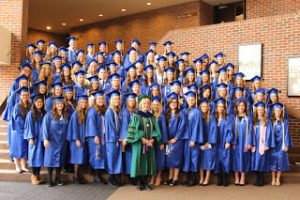Ed. note: This is the second of a two-part look by CHMP Media Fellow Melissa Patrick at nursing shortages in Kentucky hospitals. How are they, and nursing schools, coping with demand? In many ways, Kentucky’s situation mirrors the challenges in other states – which hit rural areas especially hard. Read Part I here.
This article was originally published by Kentucky Health News. Reprinted with permission as part of the CHMP Nursing and Healthcare Workforce Media Fellowship.
Staffing solutions and challenges
Both Highlands Regional Medical Center in Prestonsburg, and University of Kentucky HealthCare said shortages and a need for specialty trained nurses have caused them to start using agency nurses again.
Agency nurses, also called travel nurses, take short-term contracts that allow them to easily take time off or move around. Their contracts are usually for three months at a time.
“We have not used travel nurses in probably five to seven years,” said Susan Ellis, vice president of Patient Care Services of Highlands. “Their expense is higher than normal. . . . When you thnk for one nurse, you could potentially be paying double,” adding that this added cost “can actually put a small facility on the edge.”
Colleen Swartz, chief nurse executive at UK HealthCare, said the health system had not used agency nurses for more than a decade, but they now make up almost 2 percent of their nursing workforce, mostly in specialty areas where it takes time to train someone.
“We have a rigorous screening process we go through before we accept anyone in that agency kind of format, but honestly we’ve had some really clinically strong nurses come through who we’ve been able to utilize during this period where we’ve been unable to hire ourselves,” Swartz said.

Highlands Regional Medical Center (website photo)
Highlands also offers a sign-on bonus and an incentive program for employee referrals, but Ellis said traveling-nurse agencies also offer this incentive and have lured several of her nurses away.
“And just like I’m trying to use my staff to recruit nurses, the travel companies actually use their staff to recruit staff to travel. And we have lost individuals in our organization who wanted to go travel because they hear about this bright, shiny money travel adventure and they sign on,” she said.
In addition, Highlands is planning to hire four internationally trained nurses, who would commit to working there for two years. Ellis said they would be paid the same as the current staff, but the hospital would be responsible for their recruiting costs, including immigration fees upward of $15,000 per RN.
“I think it is another way to help the problem, and let’s say I’m cautiously optimistic,” she said.
But Fran Feltner said, “I’m not sure it is the answer.” Feltner is director of UK’s Center of Excellence in Rural Health, which focuses on improving health-care provider shortages in Appalachia.
Feltner said she understood why hospitals use internationally trained nurses, but also said they can create a language barrier to care for patients and families who already may struggle with health literacy.
Highlands has also revived its nurse-intern program as a recruiting tool. This paid “shadowing” program, which includes 14 student interns from the local nursing school, pairs an intern with a registered nurse in a department of the student’s interest, in hopes they will join Highlands upon graduation.
The program seems to be working, at least for Samantha Thomas, who will graduate in May with an associate degree in nursing from Big Sandy Community and Technical College in Prestonsburg. Thomas said she joined the internship program to explore working in the intensive care unit and plans to continue working there after graduation.
“I think it’s a really great way for Highlands to recruit nurses because once we work there, then we will want to stay,” she said. “I think I’ll stay there for at least two years until I’m really comfortable with my skills — and I may stay there forever.”
Highlands may be on to something.
UK’s Swartz, who was chief nursing officer at Clark Regional Hospital in Winchester, said that while it is often hard to recruit nurses to rural areas, once they hire on, they are often “so committed to that facility and to the people there, it was very much a service orientation to that community.”
Swartz said UK HealthCare doesn’t offer signing bonuses or incentives for employee referrals, but does have an aggressive recruiting program that touts their “amazing benefits package.”
Appalachian Regional Healthcare, an 11-hospital system that serves Eastern Kentucky and West Virginia, is reported to have severe nursing shortages, with around 177 RN job openings listed on its website, as well as many for licensed practical nurses. ARH also offers a $5,000 signing bonus for qualified full-time RNs and a $2,000 incentive to employees for referring an RN who is hired. To further meet the “dire need for nurses in Eastern Kentucky,” ARH has formed a partnership with Galen College of Nursing, a private nursing college, at ARH Hazard, which opened for its first class of associate-degree students in March.
ARH opted to not answer questions on the subject.
Partners in education
Through a strategic partnership, Swartz said UK’s College of Nursing has increased its number of graduates from 80 to 200 over the past five or six years to help the hospital meet its staffing needs.
“But honestly right now, we can probably take another doubling of class size,” she said. “The last several years we hired almost 600 nurses every year because of the growth phases that we’ve been in.”
Swartz said the hospital has had to become more “intentional and deliberate” in planning for recruitment, strategically timing the openings of floors in its new pavilion with graduation dates.
Many nursing-education programs find it hard to expand because they have aging faculty, who must be doctoral-prepared, and non-competitive pay, not to mention limited clinical access for training and student/faculty ratios that are mandated by the state. UK’s College of Nursing just posted five open faculty positions.
Another staffing challenge is that many nurses come immediately out of nursing school with their sights already set on the next job, such as nurse-midwife or nurse practitioner. Swartz said it is not unusual for UK HealthCare to turn over 12 to 15 nurses each year who leave to become certified registered nurse anesthetists.
The American Association of Colleges of Nursing says that in 2014, entry-level Bachelor of Science in Nursing programs turned away 50,681 qualified applicants. This has been common in Kentucky.
There is also a push for nurses with associate degrees, who make up 60 percent of Kentucky’s registered nurses, to get baccalaureate degrees. The state has 15 BSN programs and 40 associate-degree programs.

UK College of Nursing graduates (photo provided)
UK Nursing Dean Janie Heath said the Institute of Medicine recommends that 80 percent of the nursing workforce should be educated at the baccalaureate level by 2020, because there is growing evidence that links nurses with higher education levels to better health outcomes for patients.
“Kentucky, as well as the rest of the country, is moving the needle, but we are not going to make that 2020 mark,” Heath said.
Technology may help. The UK nursing college moved its RN-BSN program fully online in the fall of 2015, after research found that most RNs in Kentucky have easy access to computers and the internet.
And as many hospitals in the state do, both Highlands and UK HealthCare offer tuition reimbursement for employees who further their education.
Patricia “Pat” Burkhart, professor and associate dean of undergraduate faculty affairs at UK’s nursing college, said faculty are working on innovative ways to further develop the nursing workforce, with a focus on second-degree students and second-career military medics.
“What they have wanted is more fast pace,” Burkhart said. “Where our traditional students want their summers off, second degree, which we are calling second-career medics or second-degree students, want to get it done as quick as they can and want to go through the summer, so we are looking at a different model now for them.”
Looking to the future, Health said nursing schools must make sure they are educating students to have primary-care competencies, so they can manage individuals, families and communities.
Resiliency and Retention
Heath said UK’s College of Nursing is working hard to make sure its graduates have the skill sets they need to work in today’s complex environments, whether urban or rural, putting top priority on helping them learn to be resilient.
“Science is there,” Heath said, “that if we are not taking good care of ourselves, we can’t take good care of our patients, our families, our communities.”
Burkhart said, “We are seeing students coming in who are graduates that are looking for work-life balance, so much more than our generation.” She said the industry isn’t adjusting “fast enough” to this changing attitude.
Heath said it’s important for health-care facilities to create healthy environments as a way to retain nurses, suggesting the need for policies and practices that let nurses know they are supported, including things like building inter-professional relationships, or even as simple as providing pet therapy for the staff. Studies show that healthy work environments create better health outcomes for patients, she said.
“It’s the simple things,” she said. “Things like abusive behavior, bullying, screaming, yelling is not tolerated in this environment. You know, when you’ve got that coming out from the top — of zero tolerance of inappropriate behavior — that didn’t cost a thing.”
Burkhart added, “I think we all knew that we needed a caring environment for our patients, but I think [what] we are now being responsive to is that caring environment needs to translate to the staff as well, whether it is respectful discourse, or confidentiality, or the little things that show that you care about your staff, just the way we are asking staff to care about patients. Every patient, every time.”
An example of this philosophy in action is St. Joseph Martin, a critical-access hospital with 25 beds that employs about 45 RNs and is part of KentuckyOne Health. It has been selected as one of the best places to work among small employers in the annual Best Places to Work in Kentucky list for the past three years.
Billie Turner, the hospital’s chief nursing officer and vice president of patient-care services, said it doesn’t have a nursing shortage because it has a great place for nurses to work: “I strongly feel that it is a good work environment, more so than anything else, that helps us with retention.”
This article was produced as part of the Health Care Workforce Media Fellowship, run by the Center for Health, Media & Policy, New York, N.Y. The fellowship is supported by a grant from the Johnson & Johnson Foundation. Kentucky Health News is an independent news service of the Institute for Rural Journalism and Community Issues, based in the School of Journalism and Media at the University of Kentucky, with support from the Foundation for a Healthy Kentucky.
Ed. note: This is the second of






